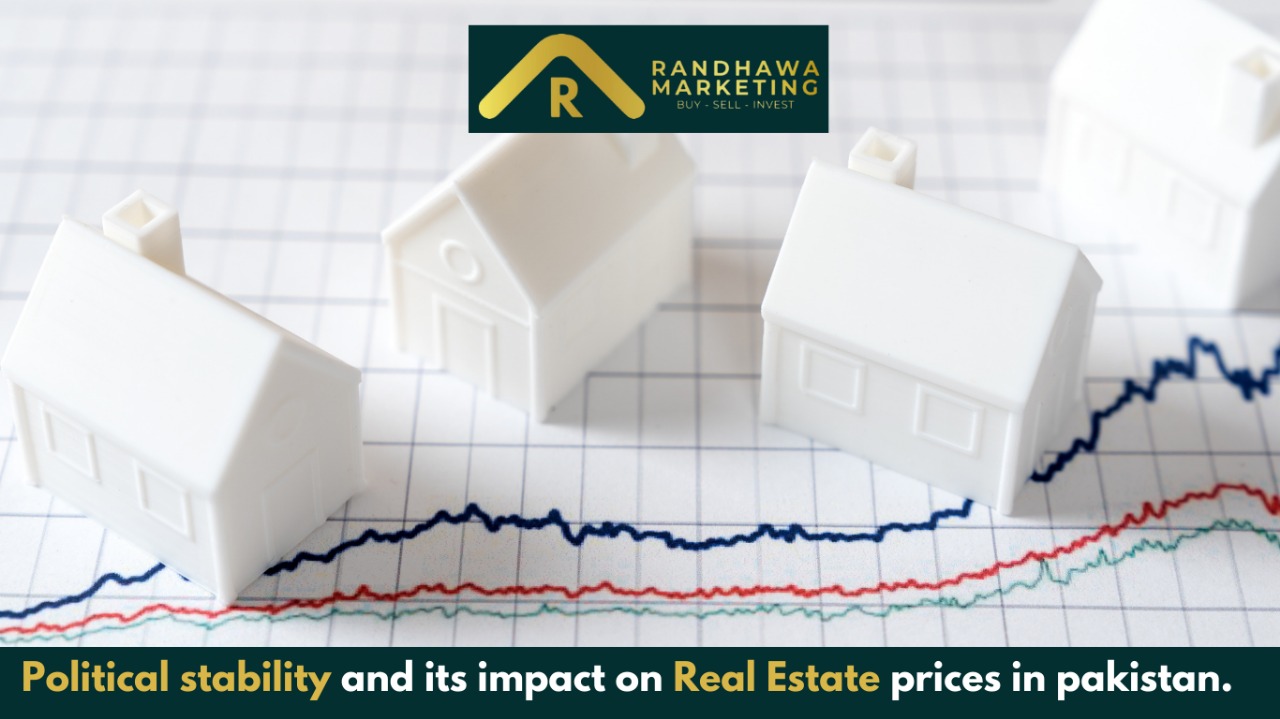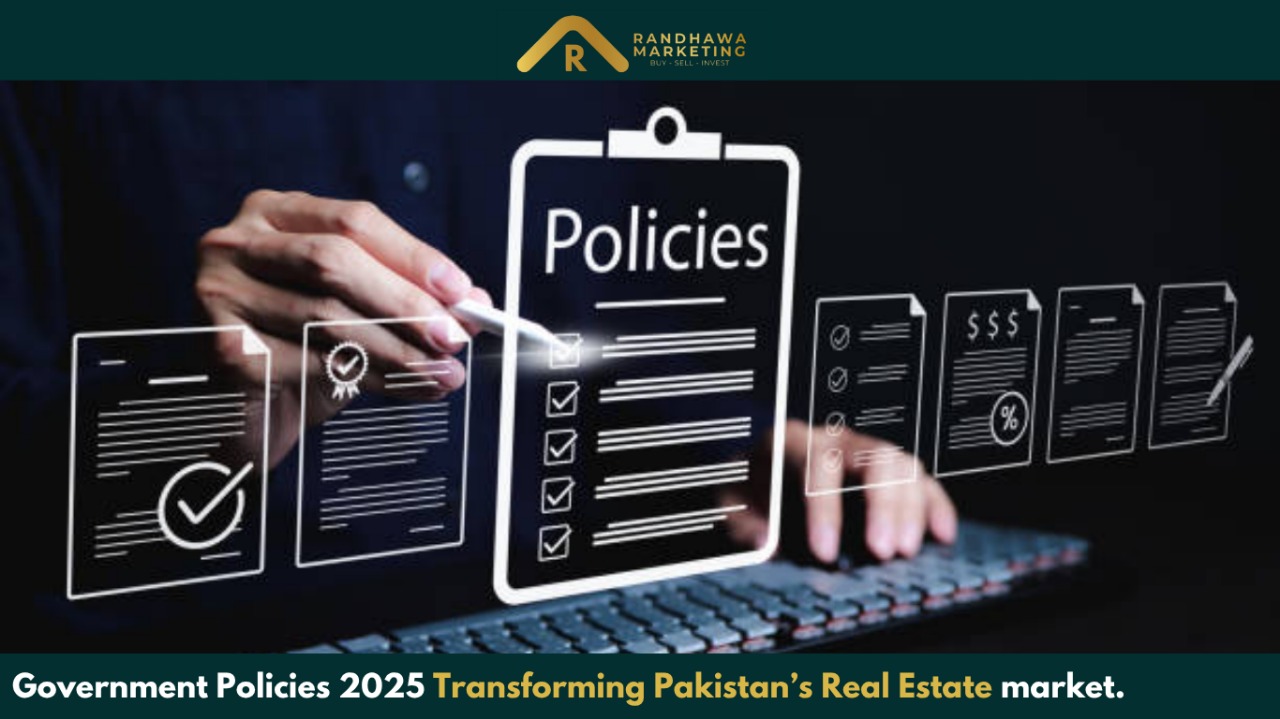
Political Stability and Its
Impact on Real Estate Prices in Pakistan
Real
estate in Pakistan has always been one of the most attractive and resilient
sectors for investment. Whether its local buyers seeking a secure future for
their families or overseas Pakistanis looking for profitable opportunities back
home, property remains a preferred choice. The reasons are clear: real estate
not only provides a sense of ownership and security but also offers steady
appreciation in value and potential rental income. For many, it is considered
safer than volatile financial markets, making it a cornerstone of long-term
wealth building in Pakistan. However, the health of this sector does not
operate in isolation. Property prices and overall market trends are deeply
influenced by the broader political environment of the country. Unlike
short-term trading, real estate is a long-term commitment that requires
confidence in the stability of policies, governance, and the economy. Investors
want assurance that the money they lock into land, houses, or commercial
projects will be protected and continue to grow over time. This confidence is
directly tied to political stability. When the political atmosphere is calm and
governments are able to function smoothly, the property market flourishes.
Infrastructure projects move forward, development in housing societies
accelerates, and both local and foreign investors feel secure enough to
participate actively. This creates stronger demand, which naturally pushes
property prices upward. In contrast, during times of political unrest such as
frequent changes in leadership, prolonged protests, or policy
uncertainty buyers and investors often adopt a “wait and see” approach. As a result,
transactions slow down, projects face delays, and property values either
stagnate or dip.
In
essence, political stability acts as the foundation on which Pakistan’s real
estate market is built. A steady and predictable political climate fuels
growth, investment, and development, while instability weakens confidence and
disrupts the sector’s momentum. For anyone analyzing the property market,
understanding this connection is crucial, as the future of real estate in
Pakistan is inseparably linked to the country’s political direction.
Investor
Confidence – The Driving Force of Real Estate Growth
At the heart of Pakistan’s
property market lies investor confidence. Real estate is not a short-term
gamble; it requires long-term commitment, large financial resources, and faith in
the country’s future. Political stability plays a key role in building that
trust. When the political climate is stable, people feel more secure about
investing their savings in plots, houses, and commercial spaces. They know that
government policies are less likely to change overnight, projects will continue
without interruption, and their investment will grow over time. This sense of
assurance fuels demand, driving property prices upward and creating a vibrant
market. On the other hand, political unrest or frequent changes in leadership
make investors hesitant. Protests, policy reversals, or uncertainty about the
future create fear of financial loss. Buyers either delay their decisions or
withdraw altogether, leading to fewer transactions and slower market activity.
As demand weakens, property values either stagnate or decline.
Simply put, political stability
acts like a safety net for investors, while instability shakes their confidence
and puts the entire market under pressure.
Infrastructure
& Economy: Catalysts for Property Appreciation
Real estate and economic growth
go hand in hand, and political stability is the key that keeps this engine
running. When governments are strong and consistent, they are able to plan,
approve, and complete large-scale development projects that directly uplift the
property market. Mega projects such as motorways, CPEC routes, modern housing
societies, international airports, and metro transport systems not only
transform the way people live but also create tremendous opportunities for
investors. Whenever a new highway, industrial zone, or commercial hub is
developed, the areas surrounding it witness a sharp rise in property demand.
For example, land prices near major road networks or economic corridors often
surge because people and businesses want to settle close to new growth centers.
On the other hand, political instability can derail this momentum. Shifts in
government, sudden changes in policy, or delays in project execution often put
a brake on development. Housing societies may face approval issues,
infrastructure projects may slow down, and investor interest begins to fade.
Without these growth drivers, property values remain stagnant, and in some
cases, they even decline.
In simple terms, a stable
government acts as a catalyst for economic growth and infrastructure
development, both of which are essential for sustaining long-term appreciation
in real estate prices.
Currency Trends
and Inflation: Key Drivers of Real Estate Demand
One of the less visible but
highly significant ways political stability impacts real estate is through its
effect on currency and inflation. When the political environment is uncertain,
the Pakistani rupee often weakens against foreign currencies. A weaker rupee
increases the cost of imported construction materials such as cement, steel,
and finishing goods, which drives up the overall cost of building houses and
commercial projects. At the same time, rising inflation makes everyday living
more expensive, reducing the purchasing power of average citizens. As a result,
fewer people can afford to invest in property, and the market slows down. For
overseas Pakistanis, who contribute a major share of investment in the sector,
political and currency instability is equally discouraging. They often fear
that their hard-earned remittances will lose value or that their investment may
not generate the expected returns. This hesitation pushes them to look for
safer and more stable markets abroad, diverting potential capital away from
Pakistan’s property sector.
On the other hand, when the
political climate is stable, the rupee remains relatively strong, inflation is
more controlled, and construction costs are predictable. This creates a more
affordable environment for both buyers and builders. With greater economic
certainty, people feel more confident about purchasing property, which leads to
healthier demand and steady growth in real estate prices.
Foreign
Investment and Overseas Pakistanis in Pakistan’s Property Market
Overseas Pakistanis are the
backbone of Pakistan’s real estate sector. Every year, they send billions of
dollars in remittances, and a large portion of this money flows into property
purchases—whether in the form of family homes, plots for future security, or
commercial investments. For many expatriates, investing in real estate back home
is not just about financial returns; it’s also about maintaining a connection
to their roots and securing long-term assets for their families. When the
political environment is stable, overseas investors feel confident that their
money is safe. They are more willing to purchase plots in developing housing
schemes, buy apartments in urban centers, or invest in commercial projects,
knowing that government policies are unlikely to change overnight. This inflow
of foreign capital creates higher demand in the market, pushing property prices
upward and fueling broader economic activity. However, uncertainty in politics
can quickly change this dynamic. Fears of policy reversals, corruption, or
sudden shifts in regulations often discourage overseas Pakistanis from committing
their savings to local real estate. Instead, they divert their investments to
safer, more stable markets such as the UAE, the UK, or Canada. This outflow of
potential investment weakens the property sector in Pakistan, reducing demand
and slowing price growth.
Overseas Pakistanis and foreign
investors play a pivotal role in shaping Pakistan’s real estate trends, but
their participation depends heavily on political stability and the confidence
it brings.
The Impact of
Liquidity on Real Estate Transactions
Another critical way political
stability shapes the real estate sector is through its impact on market
liquidity—the ease with which properties can be bought and sold. In a stable
environment, banks and developers are more confident in offering financing
options, flexible payment plans, and mortgage facilities. These measures make
property ownership more accessible to middle-class buyers and encourage greater
participation from investors. As a result, transaction volumes rise, properties
change hands more frequently, and the market remains active and dynamic. On the
other hand, political instability has the opposite effect. When uncertainty
looms, financial institutions become cautious, developers face delays in
launching or completing projects, and buyers hesitate to commit. This causes
market activity to slow down, leaving many properties unsold for long periods.
Sellers are often forced to reduce prices or offer heavy discounts just to
attract buyers, which drags overall property values downward.
In simple terms, political
stability keeps the real estate market liquid and moving, while instability
freezes activity, reduces demand, and weakens price growth. The more active the
transactions, the healthier and stronger the property sector becomes.
Property Market
Behavior During Stability and Instability
The overall direction of
Pakistan’s property market largely depends on whether the country is
experiencing political stability or instability. In stable times, the real
estate sector shows clear signs of growth. Prices increase steadily,
construction activity gains momentum, and new housing societies as well as
commercial hubs begin to expand across major cities. Stability also attracts
foreign real estate firms and investors, who see Pakistan as a market with
long-term potential. Together, these factors create a cycle of confidence and
progress, where both local and overseas buyers actively participate in the
market. Conversely, when the political climate is uncertain, the real estate
sector loses its momentum. Prices either stagnate or decline because of reduced
demand. Foreign investors, who are often sensitive to risk, pull back their
interest, while local buyers prefer to wait for the situation to settle before
making big decisions. Developers, too, struggle to complete projects due to
delays in approvals, financing issues, or lack of buyer confidence. This
slowdown affects not only the property market but also related industries such
as construction, materials, and labor, further weakening the sector’s growth.
In short, stability drives
optimism and expansion in real estate, while instability leads to hesitation,
reduced activity, and stalled development.
Real Estate
Outlook: Balancing Short-Term Trends and Long-Term Value"
The impact of political
conditions on real estate can be seen both in the short term and over the long
run. In the short term, episodes of political unrest often trigger sudden drops
in property prices and a noticeable decline in buying and selling activity.
Investors adopt a cautious approach, waiting for clarity before making
decisions, which results in temporary slowdowns across the market. However,
these effects are usually reversible once stability returns. In contrast, the
long-term picture is shaped by consistent political stability. When a country
enjoys years of steady governance and predictable policies, the property market
experiences sustainable growth. Land and housing prices appreciate gradually,
developers are able to complete projects on time, and investors build
significant wealth over the years. This long-term stability not only benefits
individual property holders but also strengthens the overall economy by
creating jobs, attracting foreign investment, and fueling urban development.
FINAL TOUGHTS
Political stability serves as the
foundation upon which Pakistan’s real estate market stands. It is the single
most important factor that influences investor confidence, the pace of
infrastructure development, the strength of the currency, and the flow of
foreign capital into the country. When the political climate is steady, the
property market thrives—prices rise at a healthy pace, new projects are
launched and completed on time, and both local and overseas investors feel
secure in channeling their savings into real estate. This not only strengthens
the property sector itself but also supports broader economic growth by
creating jobs and boosting allied industries such as construction and banking. On
the other hand, instability disrupts this cycle. Uncertainty about the future
makes investors hesitant, reduces market activity, and causes property values
to fluctuate or even decline. Developers face delays, projects stall, and
buyers adopt a wait-and-see approach, weakening one of the country’s most
important economic sectors.
For anyone considering property
investment in Pakistan, it is clear that political trends matter just as much
as the location, budget, or type of property. A stable and predictable
political environment provides the confidence needed for real estate to serve
as a reliable avenue for wealth creation and long-term security.


